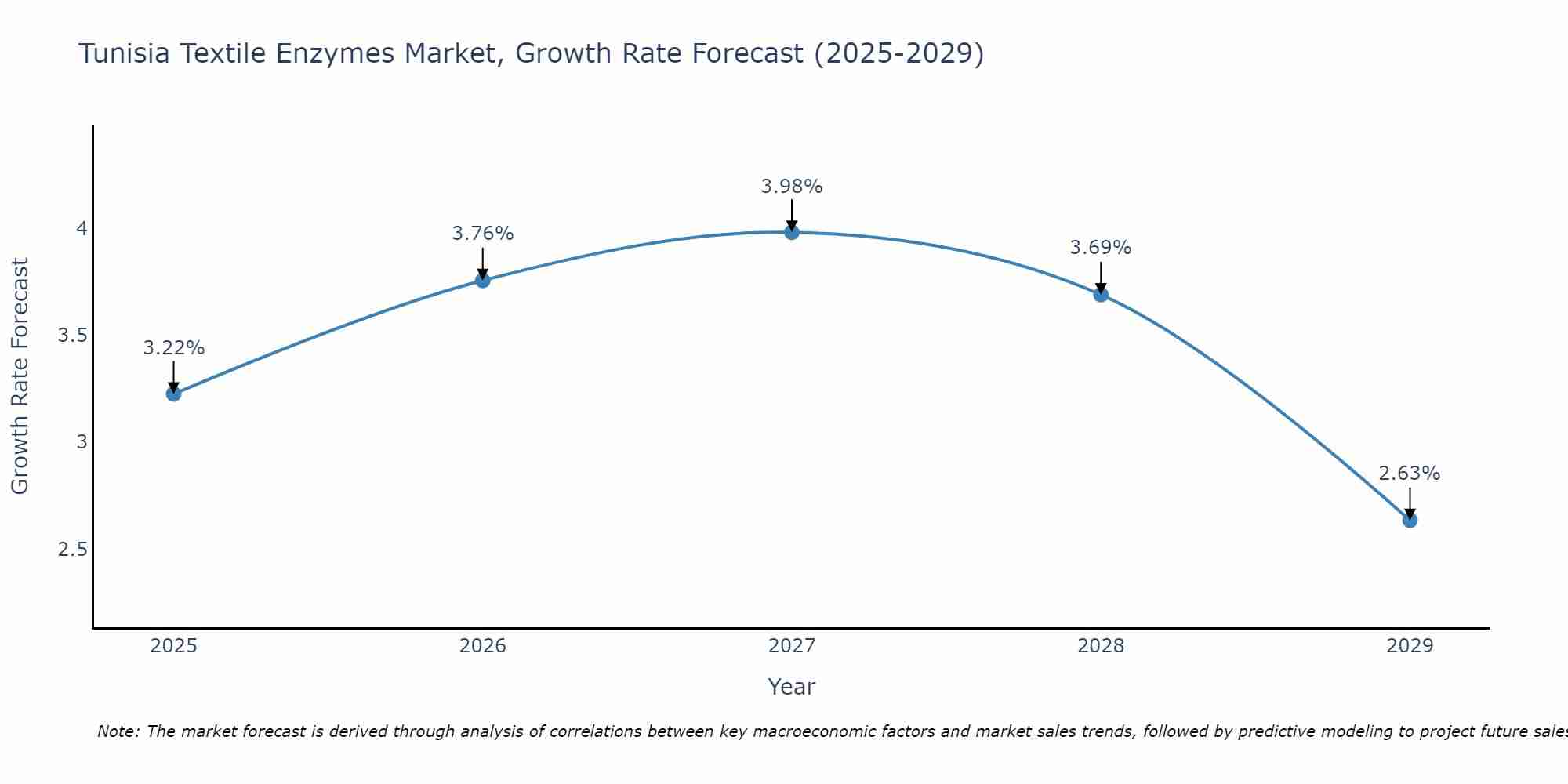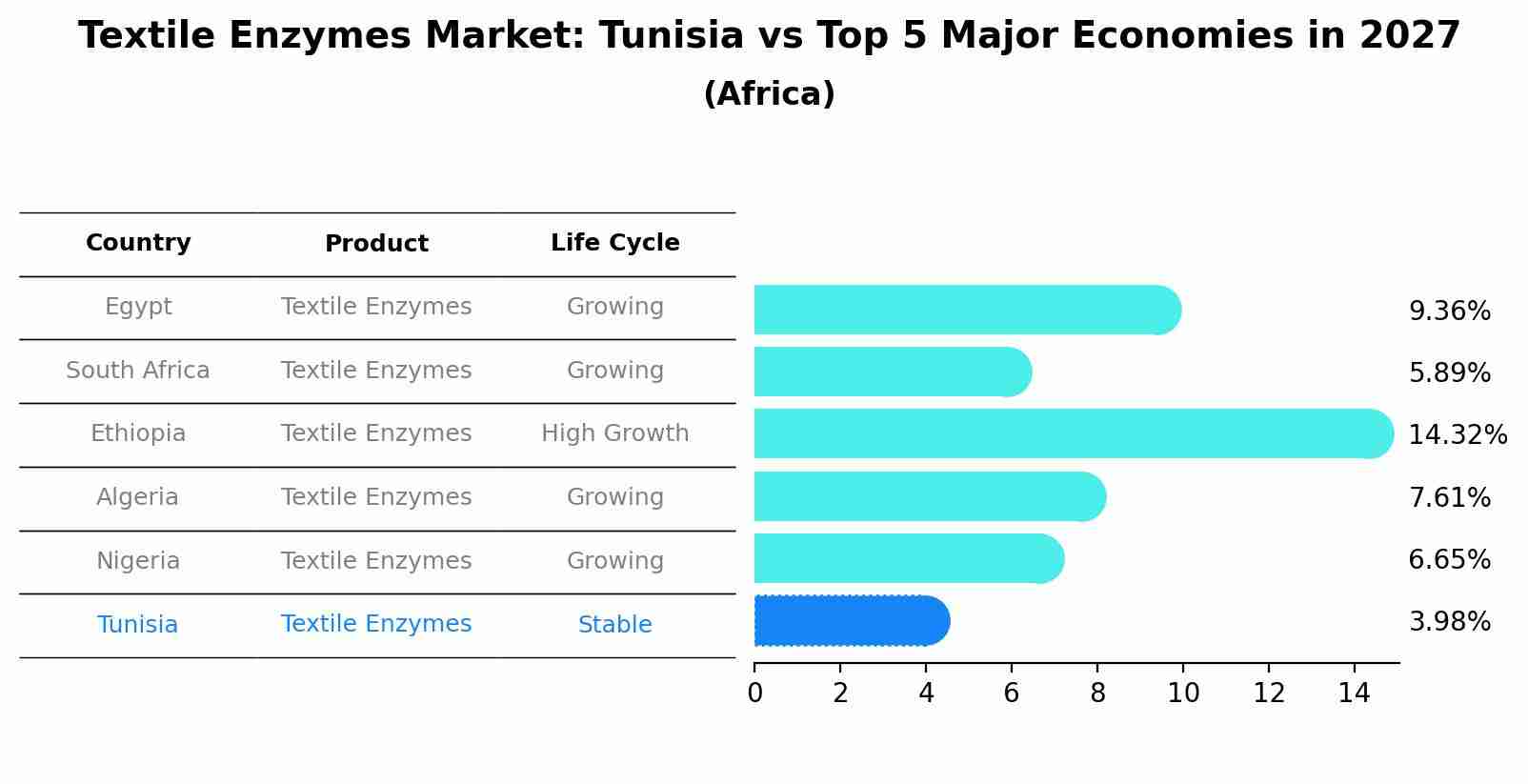Tunisia Textile Enzymes Market Outlook | COVID-19 IMPACT, Size, Value, Forecast, Companies, Analysis, Growth, Revenue, Industry, Share & Trends
| Product Code: ETC094093 | Publication Date: Jun 2021 | Updated Date: Jun 2025 | Product Type: Report | |
| Publisher: 6Wresearch | Author: Bhawna Singh | No. of Pages: 70 | No. of Figures: 35 | No. of Tables: 5 |
Tunisia Textile Enzymes Market Size Growth Rate
The Tunisia Textile Enzymes Market is projected to witness mixed growth rate patterns during 2025 to 2029. Growth accelerates to 3.98% in 2027, following an initial rate of 3.22%, before easing to 2.63% at the end of the period.

Textile Enzymes Market: Tunisia vs Top 5 Major Economies in 2027 (Africa)
Tunisia's Textile Enzymes market is anticipated to experience a stable growth rate of 3.98% by 2027, reflecting trends observed in the largest economy Egypt, followed by South Africa, Ethiopia, Algeria and Nigeria.

Tunisia Textile Enzymes Market Overview
The Tunisia Textile Enzymes Market is experiencing steady growth driven by the increasing demand for eco-friendly and sustainable textile processing solutions. Enzymes are being widely adopted in the textile industry for various applications such as desizing, bio-polishing, and denim finishing, as they offer cost-effective and environmentally friendly alternatives to traditional chemical processes. The market is witnessing a rise in research and development activities aimed at developing innovative enzyme solutions tailored to meet the specific needs of the textile industry in Tunisia. Key players in the market are focusing on product innovation and strategic collaborations to gain a competitive edge. Additionally, the growing awareness among consumers regarding the environmental impact of textile production is expected to further drive the demand for textile enzymes in Tunisia.
Tunisia Textile Enzymes Market Trends
The Tunisia Textile Enzymes Market is experiencing a shift towards sustainable and eco-friendly enzyme solutions. Enzymes that offer reduced water and energy consumption, as well as improved biodegradability, are gaining popularity among textile manufacturers in Tunisia. There is a growing demand for enzymes that can enhance the performance of textile processes such as desizing, bio-polishing, and denim finishing while minimizing environmental impact. Additionally, there is a trend towards customization and innovation in enzyme products, with manufacturers focusing on developing specialized solutions tailored to the specific needs of the textile industry in Tunisia. Overall, the market is witnessing a move towards greener and more efficient enzyme technologies to meet the increasing sustainability requirements of the textile sector in the region.
Tunisia Textile Enzymes Market Challenges
In the Tunisia Textile Enzymes Market, some challenges are encountered due to factors such as limited awareness about the benefits of using enzymes in textile processing among manufacturers, leading to hesitancy in adopting enzyme-based solutions. Additionally, the high costs associated with purchasing and implementing enzyme technologies can pose a barrier for small and medium-sized textile companies in Tunisia. Another challenge is the lack of specialized technical expertise in utilizing enzymes effectively in textile processing, which can hinder the optimal utilization of these products. To overcome these challenges, targeted educational initiatives to increase awareness, cost-effective enzyme solutions, and training programs to enhance technical capabilities could be beneficial for the growth and development of the Tunisia Textile Enzymes Market.
Tunisia Textile Enzymes Market Investment Opportunities
In the Tunisia Textile Enzymes Market, there are several promising investment opportunities for businesses looking to capitalize on the increasing demand for sustainable and eco-friendly textile processing solutions. Enzymes are being increasingly used in the textile industry to achieve various benefits such as reduced water and energy consumption, improved product quality, and lower environmental impact. Investing in research and development of innovative enzyme products tailored to the specific needs of the Tunisian textile market can be lucrative. Additionally, establishing partnerships with local textile manufacturers to provide enzyme solutions for their processing needs can create a strong competitive advantage. With the growing trend towards sustainability in the textile industry, investing in the Tunisia Textile Enzymes Market presents a promising opportunity for long-term growth and success.
Tunisia Textile Enzymes Market Government Policy
The Tunisian government has implemented various policies to support the growth of the textile enzymes market in the country. This includes providing incentives and subsidies to textile manufacturers to adopt enzyme-based processes for textile production, in line with the government`s focus on promoting sustainable and eco-friendly practices. Additionally, the government has introduced regulations to ensure the safe use of enzymes in the textile industry, including quality standards and environmental guidelines. These policies aim to enhance the competitiveness of the Tunisian textile sector, improve product quality, reduce environmental impact, and attract foreign investment in the industry. Overall, the government`s supportive policies are expected to drive growth and innovation in the Tunisia Textile Enzymes Market.
Tunisia Textile Enzymes Market Future Outlook
The future outlook for the Tunisia Textile Enzymes Market appears promising as the industry is expected to witness steady growth driven by increasing demand for eco-friendly and sustainable textile processing solutions. Textile enzymes are gaining traction due to their ability to improve efficiency, reduce water and energy consumption, and enhance product quality in the textile manufacturing process. With a growing emphasis on environmental regulations and consumer awareness towards sustainable practices, the adoption of textile enzymes is projected to rise in Tunisia. Additionally, advancements in enzyme technology, research and development activities, and collaborations between key market players are likely to further fuel market growth. Overall, the Tunisia Textile Enzymes Market is anticipated to expand in the coming years, offering opportunities for innovation and development in the textile industry.
Key Highlights of the Report:
- Tunisia Textile Enzymes Market Outlook
- Market Size of Tunisia Textile Enzymes Market, 2021
- Forecast of Tunisia Textile Enzymes Market, 2027
- Historical Data and Forecast of Tunisia Textile Enzymes Revenues & Volume for the Period 2018 - 2027
- Tunisia Textile Enzymes Market Trend Evolution
- Tunisia Textile Enzymes Market Drivers and Challenges
- Tunisia Textile Enzymes Price Trends
- Tunisia Textile Enzymes Porter's Five Forces
- Tunisia Textile Enzymes Industry Life Cycle
- Historical Data and Forecast of Tunisia Textile Enzymes Market Revenues & Volume By Type for the Period 2018 - 2027
- Historical Data and Forecast of Tunisia Textile Enzymes Market Revenues & Volume By Cellulase for the Period 2018 - 2027
- Historical Data and Forecast of Tunisia Textile Enzymes Market Revenues & Volume By Amylase for the Period 2018 - 2027
- Historical Data and Forecast of Tunisia Textile Enzymes Market Revenues & Volume By Catalase for the Period 2018 - 2027
- Historical Data and Forecast of Tunisia Textile Enzymes Market Revenues & Volume By Pectinase for the Period 2018 - 2027
- Historical Data and Forecast of Tunisia Textile Enzymes Market Revenues & Volume By Laccase for the Period 2018 - 2027
- Historical Data and Forecast of Tunisia Textile Enzymes Market Revenues & Volume By Others for the Period 2018 - 2027
- Historical Data and Forecast of Tunisia Textile Enzymes Market Revenues & Volume By Application for the Period 2018 - 2027
- Historical Data and Forecast of Tunisia Textile Enzymes Market Revenues & Volume By Bio-polishing for the Period 2018 - 2027
- Historical Data and Forecast of Tunisia Textile Enzymes Market Revenues & Volume By Desizing for the Period 2018 - 2027
- Historical Data and Forecast of Tunisia Textile Enzymes Market Revenues & Volume By Enzymatic Bleaching for the Period 2018 - 2027
- Historical Data and Forecast of Tunisia Textile Enzymes Market Revenues & Volume By Bioscouring for the Period 2018 - 2027
- Historical Data and Forecast of Tunisia Textile Enzymes Market Revenues & Volume By Others for the Period 2018 - 2027
- Tunisia Textile Enzymes Import Export Trade Statistics
- Market Opportunity Assessment By Type
- Market Opportunity Assessment By Application
- Tunisia Textile Enzymes Top Companies Market Share
- Tunisia Textile Enzymes Competitive Benchmarking By Technical and Operational Parameters
- Tunisia Textile Enzymes Company Profiles
- Tunisia Textile Enzymes Key Strategic Recommendations
Frequently Asked Questions About the Market Study (FAQs):
Export potential assessment - trade Analytics for 2030
Export potential enables firms to identify high-growth global markets with greater confidence by combining advanced trade intelligence with a structured quantitative methodology. The framework analyzes emerging demand trends and country-level import patterns while integrating macroeconomic and trade datasets such as GDP and population forecasts, bilateral import–export flows, tariff structures, elasticity differentials between developed and developing economies, geographic distance, and import demand projections. Using weighted trade values from 2020–2024 as the base period to project country-to-country export potential for 2030, these inputs are operationalized through calculated drivers such as gravity model parameters, tariff impact factors, and projected GDP per-capita growth. Through an analysis of hidden potentials, demand hotspots, and market conditions that are most favorable to success, this method enables firms to focus on target countries, maximize returns, and global expansion with data, backed by accuracy.
By factoring in the projected importer demand gap that is currently unmet and could be potential opportunity, it identifies the potential for the Exporter (Country) among 190 countries, against the general trade analysis, which identifies the biggest importer or exporter.
To discover high-growth global markets and optimize your business strategy:
Click Here- Single User License$ 1,995
- Department License$ 2,400
- Site License$ 3,120
- Global License$ 3,795
Search
Thought Leadership and Analyst Meet
Our Clients
Related Reports
- Saudi Arabia Car Window Tinting Film, Paint Protection Film (PPF), and Ceramic Coating Market (2025-2031) | Strategy, Consumer Insights, Analysis, Investment Trends, Opportunities, Growth, Size, Share, Industry, Revenue, Segments, Value, Segmentation, Supply, Forecast, Restraints, Outlook, Competition, Drivers, Trends, Demand, Pricing Analysis, Competitive, Strategic Insights, Companies, Challenges
- South Africa Stationery Market (2025-2031) | Share, Size, Industry, Value, Growth, Revenue, Analysis, Trends, Segmentation & Outlook
- Afghanistan Rocking Chairs And Adirondack Chairs Market (2026-2032) | Size & Revenue, Competitive Landscape, Share, Segmentation, Industry, Value, Outlook, Analysis, Trends, Growth, Forecast, Companies
- Afghanistan Apparel Market (2026-2032) | Growth, Outlook, Industry, Segmentation, Forecast, Size, Companies, Trends, Value, Share, Analysis & Revenue
- Canada Oil and Gas Market (2026-2032) | Share, Segmentation, Value, Industry, Trends, Forecast, Analysis, Size & Revenue, Growth, Competitive Landscape, Outlook, Companies
- Germany Breakfast Food Market (2026-2032) | Industry, Share, Growth, Size, Companies, Value, Analysis, Revenue, Trends, Forecast & Outlook
- Australia Briquette Market (2025-2031) | Growth, Size, Revenue, Forecast, Analysis, Trends, Value, Share, Industry & Companies
- Vietnam System Integrator Market (2025-2031) | Size, Companies, Analysis, Industry, Value, Forecast, Growth, Trends, Revenue & Share
- ASEAN and Thailand Brain Health Supplements Market (2025-2031) | Strategy, Consumer Insights, Analysis, Investment Trends, Opportunities, Growth, Size, Share, Industry, Revenue, Segments, Value, Segmentation, Supply, Forecast, Restraints, Outlook, Competition, Drivers, Trends, Demand, Pricing Analysis, Competitive, Strategic Insights, Companies, Challenges
- ASEAN Bearings Market (2025-2031) | Strategy, Consumer Insights, Analysis, Investment Trends, Opportunities, Growth, Size, Share, Industry, Revenue, Segments, Value, Segmentation, Supply, Forecast, Restraints, Outlook, Competition, Drivers, Trends, Demand, Pricing Analysis, Competitive, Strategic Insights, Companies, Challenges
Industry Events and Analyst Meet
Whitepaper
- Middle East & Africa Commercial Security Market Click here to view more.
- Middle East & Africa Fire Safety Systems & Equipment Market Click here to view more.
- GCC Drone Market Click here to view more.
- Middle East Lighting Fixture Market Click here to view more.
- GCC Physical & Perimeter Security Market Click here to view more.
6WResearch In News
- Doha a strategic location for EV manufacturing hub: IPA Qatar
- Demand for luxury TVs surging in the GCC, says Samsung
- Empowering Growth: The Thriving Journey of Bangladesh’s Cable Industry
- Demand for luxury TVs surging in the GCC, says Samsung
- Video call with a traditional healer? Once unthinkable, it’s now common in South Africa
- Intelligent Buildings To Smooth GCC’s Path To Net Zero


















